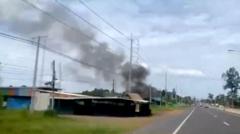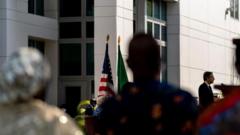Historical bonds between Thailand and Cambodia have soured, erupting into violence following a leaked phone call scandal involving leaders from both countries. As tensions escalate, the potential for further military conflict looms on the horizon.
Rising Tensions: The Breakdown of Friendship Between Thailand and Cambodia

Rising Tensions: The Breakdown of Friendship Between Thailand and Cambodia
A recent border skirmish highlights the deteriorating relations between Thailand and Cambodia, fueled by leaked conversations and political maneuvers.
In a shocking turn of events, the longstanding yet fragile relationship between Thailand and Cambodia has faced a significant fracture, igniting violent confrontations along their disputed border. The clash comes in the wake of a deeply embarrassing incident involving Cambodian Prime Minister Hun Sen, who publicly leaked a private conversation with Thailand's Prime Minister Paetongtarn Shinawatra. This breach of trust followed an unstable period marked by occasional military skirmishes that have historically resulted in casualties.
The border area, characterized by lush forests and contested territories, has seen escalating tensions since the beginning of this month. The incident on July 24, which left 12 civilians dead, occurred after five Thai soldiers suffered injuries due to a landmine explosion. In the past, military leaders from both nations have made concerted efforts to maintain peace, with successful discussions following similar violent incidents that thankfully avoided further escalation.
However, the timeline of events drastically turned when Hun Sen chose to disclose the private dialogue, wherein Paetongtarn not only referred to him as "uncle," but also expressed criticisms regarding the conduct of a senior military official. This move has led to dire repercussions for Paetongtarn, as she was suspended from her role and faces threats of permanent dismissal as the Constitutional Court deliberates her political future.
The fallout from this scandal has triggered a wave of accusations, with many criticizing Paetongtarn for her failure to navigate the sensitive relations between the two countries that were once bolstered by her father's connections. The leaked conversation has raised the specter of betrayal for the Shinawatra family, which once enjoyed close ties with the Cambodian leadership.
Moreover, underlying tensions have surfaced as Thailand has begun investigations into certain Cambodian business figures linked to illicit operations, while trade between the two countries is increasingly stagnant. Aggression appears to be escalating from both sides, with Cambodians citing secret documentation against Thaksin Shinawatra – a move perceived as a nationalist play by Prime Minister Hun Sen.
As Thailand expels the Cambodian ambassador and recalls its own envoy, the risk of escalating military confrontations rises, and a dangerous stalemate has emerged. Both nations are led by inexperienced leaders struggling with economic pressures and public sentiment, making compromise seemingly impossible in the immediate future.
Amidst this turmoil, ASEAN's role is critical in facilitating dialogue and fostering peace among its member states, echoing its founding principles. The long-term implications of this conflict remain uncertain, yet the motives behind Hun Sen's dramatic shift in diplomacy are still shrouded in mystery. Whether this decision stems from economic factors or a personal strategy to enhance his nationalist credentials could shape the trajectory between these two Southeast Asian neighbors.
The border area, characterized by lush forests and contested territories, has seen escalating tensions since the beginning of this month. The incident on July 24, which left 12 civilians dead, occurred after five Thai soldiers suffered injuries due to a landmine explosion. In the past, military leaders from both nations have made concerted efforts to maintain peace, with successful discussions following similar violent incidents that thankfully avoided further escalation.
However, the timeline of events drastically turned when Hun Sen chose to disclose the private dialogue, wherein Paetongtarn not only referred to him as "uncle," but also expressed criticisms regarding the conduct of a senior military official. This move has led to dire repercussions for Paetongtarn, as she was suspended from her role and faces threats of permanent dismissal as the Constitutional Court deliberates her political future.
The fallout from this scandal has triggered a wave of accusations, with many criticizing Paetongtarn for her failure to navigate the sensitive relations between the two countries that were once bolstered by her father's connections. The leaked conversation has raised the specter of betrayal for the Shinawatra family, which once enjoyed close ties with the Cambodian leadership.
Moreover, underlying tensions have surfaced as Thailand has begun investigations into certain Cambodian business figures linked to illicit operations, while trade between the two countries is increasingly stagnant. Aggression appears to be escalating from both sides, with Cambodians citing secret documentation against Thaksin Shinawatra – a move perceived as a nationalist play by Prime Minister Hun Sen.
As Thailand expels the Cambodian ambassador and recalls its own envoy, the risk of escalating military confrontations rises, and a dangerous stalemate has emerged. Both nations are led by inexperienced leaders struggling with economic pressures and public sentiment, making compromise seemingly impossible in the immediate future.
Amidst this turmoil, ASEAN's role is critical in facilitating dialogue and fostering peace among its member states, echoing its founding principles. The long-term implications of this conflict remain uncertain, yet the motives behind Hun Sen's dramatic shift in diplomacy are still shrouded in mystery. Whether this decision stems from economic factors or a personal strategy to enhance his nationalist credentials could shape the trajectory between these two Southeast Asian neighbors.



















